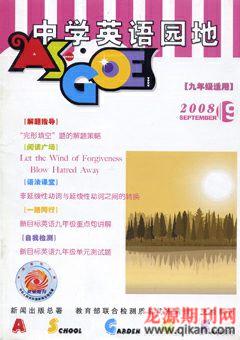形似句辨析
2008-10-16张娟
张 娟
1.A.They are not a little tired.他们很累。
B.They are not a bit tired.他们一点也不累。
简析:A句中not a little意为“很;非常”,相当于very;B句中not a bit意为“一点也不”,相当于not...at all。
2.A.He is not taller than I.他没有我高。
B.He is no taller than I.他并不比我高。
简析:A句中的“not + 比较级 + than”意为“没有……”;B句中的“no + 比较级 + than”意为“并不比……更……”。整个句意是:(我个子不高)他也不比我高到哪里去。
3.A.He forgot opening the window.他忘了打开过窗户。
B.He forgot to open the window.他忘了打开窗户。
简析:A句中用opening the window作forgot的宾语,表示“忘了已打开过窗户”这件事(实际上窗户已打开);B句中用to open the window作forgot的宾语,表示“忘记打开窗户了”(实际上窗户还没有打开)。
4.A.Neither this pen nor that one is mine.这支钢笔和那支钢笔都不是我的。
B.Either this pen or that one is mine.不是这支钢笔就是那支钢笔,其中总有一支是我的。
简析:A句中的neither...nor意为“既不……也不……”,它连接的两个部分均被否定;B句中的either...or...意为“不是……就是……”,在它连接的两个部分中,只否定其一。
5.A.The little girl is too happy to speak.那小女孩高兴得说不出话来。
B.The little girl is only too happy to speak.那小女孩非常乐意讲话。
简析:A句可转换为:The little girl is so happy that she cant speak.B句中的only too相当于very。
6.A.She has a brother,who is a doctor.她有个兄弟,这个兄弟是个医生。
B.She has a brother who is a doctor.她有个当医生的兄弟。
简析:A句中“who”引导的是非限制性定语从句,对a brother作一补充说明,并含有“可能只有一个兄弟”之意;B句中的“who”引导的是限制性定语从句,修饰a brother,含有“可能不止一个兄弟”的意思。
7.A.Its five years since he came here.他来这儿有五年了。
B.Its five years since he lived here.他有五年不住在这儿了。
简析:若since从句中的谓语为终止性动词,则主句中包含的时间段是从这一“时刻”算起;若since从句中的谓语为延续性动词或状态性动词,则主句中包含的时间段是从其动作结束“那点”算起。
8.A.Jack had a word with Tom yesterday.昨天杰克同汤姆谈了话。
B.Jack had words with Tom yesterday.昨晚杰克同汤姆吵架了。
简析:A句中的have a word with sb意为“同某人谈一谈”;B句中的have words with sb则意为“同某人吵架”。
9.A.I have nothing to write.我没有什么可写的。
B.I have nothing to write with.写字用的东西,我什么也没有。
简析:A句指没有可写的内容或事情;B句指没有写字用的钢笔或铅笔之类的东西。
10.A.She left but an hour ago.她一小时前刚离开。
B.But she left an hour ago.可是她一小时前走了。
简析:A句中的but是副词,意为“仅仅,不过(相当于only)”;B句中的but是连词,意为“可是,但是”。
11.A.He has no one help him.他不求任何人帮助。
B.He has no one to help him.没有人帮助他。
简析:A句中的has是使役动词,意为“叫,让”,help him是省略to的动词不定式短语,作no one的宾语补足语;B句中的has表示“有”,to help him在句中作no one的定语。
12.A.He is an only child.他是唯一的孩子。
B.He is only a child.他只不过是个孩子。
C.Only he is a child.只有他是个孩子。
简析:A句中的only是形容词,意思是“唯一的”;B句中的only是副词,意思是“只不过”;C句中的only也是副词,意思是“只有,仅仅”。
13.A.It is the most interesting book.这是一本最有趣的书。
B.It is a most interesting book.这是一本很有趣的书。
简析:the most interesting意为“最有趣的”;a most interesting意为“十分有趣的”或“很有趣的”。
14.A.Please tell him not to come if it rains tomorrow.如果明天下雨,请告诉他不要来。
B.Please tell him if it will rain tomorrow.请告诉他明天是否下雨。
简析:A句中的if意为“如果”,用来引导条件状语从句,从句中谓语动词用一般现在时表示将来时间;B句中的if意为“是否”,用来引导宾语从句,从句谓语动词的时态可根据实际情况而定。
15.A.I shall be here by six.我将在六点以前到这儿。
B.I shall be here till six.六点以前我将一直在这儿。
简析:by可用来表示动作完成的时间点,而till表示动作延续到某一时限。
16.A.How heavy is the box? 那箱子有多重?
B.How heavy the box is! 那箱子多重啊!
简析:A句是由how heavy引起的特殊疑问句。B句是由“how heavy + 主语 + 谓语”构成的感叹句。
17.A.They are students of Grade Three.他们是三年级的学生。
B.They are the students of Grade Three.他们是三年级的全体学生。
简析:名词复数前不加定冠词表示部分;名词复数前加上定冠词表示全体。
18.A.Miss Gao went on to read a book.高小姐接下来看书。
B.Miss Gao went on reading a book.高小姐继续看书。
简析:go on意为“继续”,go on to do sth意为“停下以前做的事,接着做另一件事”;go on doing sth意为“继续做以前做的事”。
19.A.They found the dead dog.他们找到了那条死狗。
B.They found the dog dead.他们发现那条狗死了。
简析:A句中的形容词dead作定语,修饰名词dog;the dead dog是宾语,谓语动词found应译为“找到”或“发现”;B句中的dead是形容词作宾语the dog的补足语,the dog dead是复合宾语,谓语动词found只能理解为“发现”。
20.A.Please tell me when he comes back.当他回来时,请告诉我。
B.Please tell me when he will come back.请告诉我他什么时候回来。
简析:A句中的when he comes back是由when引导的时间状语从句,when是“当……时“之意;B句中的when he will come back是由when引导的宾语从句,when意为“什么时候”。
21.A.There are too many trees on the hill.小山丘上的树太多了。
B.There are many trees on the hill,too.小山上也有许多树。
简析:A句中的too是副词,意为“太”,修饰形容词many;B句中的too是副词,意为“也”,通常位于句尾,其前有逗号隔开。
22.A.He has to spend much money.他不得不花费许多钱。
B.He has much money to spend.他有许多钱要花。
简析:has to do sth意为(外界原因迫使人)“不得不”去做某事;B句中的has意为“有”,to spend在句中作定词,修饰money。
23.A.He went to bed about nine yesterday evening.昨天晚上他是大约九点上床睡觉。
B.He went to sleep about nine yesterday evening.昨天晚上他大约九点睡着的。
简析:go to bed意为“上床睡觉”,但不一定“睡着”;go to sleep意为“睡着”。
24.A.Who are you going to play with? 你将和谁一起玩?
B.Who are you going to play? 你将和谁比赛?
简析:A句中的play with表示“和……一起玩”,who作with的宾语;B句中的play是及物动词,有“与……比赛”的意思,who作play的宾语。
25.A.How many people are there in your country? 你们国家有多少人?
B.How many peoples are there in your country? 你们国家有多少民族?
简析:people意为“人”、“人们”,是集体名词,没有复数形式。而peoples指各个国家或地区的不同民族。a people意为“一个民族”。
